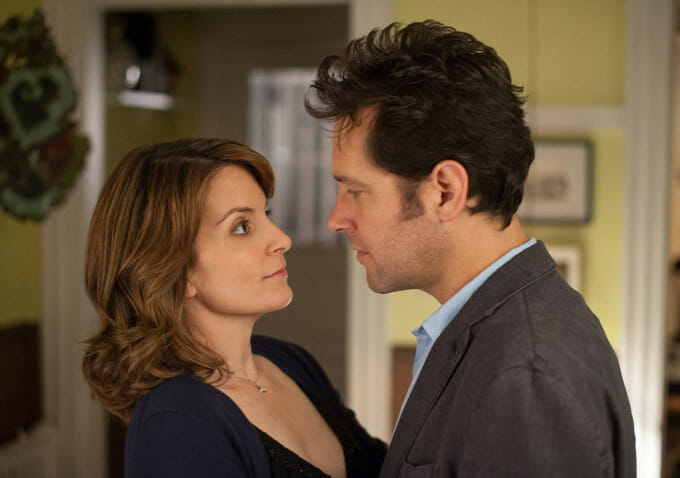
Paul Rudd and Tina Fey are both eminently likable presences on screen. Rudd’s easygoing, affable charm and comedic timing can set the right tone for any project, and Fey is such a well-respected comedienne that it’s nearly impossible to root against her. Paired together in a romantic comedy aimed squarely at the easy target of American higher education, and you’d expect a lot—sparks, sharp wit, and a generally good time at the movies. Unfortunately for them both (and for the audience), Admission never gives its world-class players the opportunity to do anything but sit on the sidelines while the film goes in circles, trying to find a consistent tone without ever getting out of its own way.
Fey plays Portia Nathan, the kind of uptight career woman we’ve come to expect in the standard-issue studio rom-com these days. She is one of the gatekeepers to Princeton University, an admissions officer who tries to downplay the notion of competition to those eager young minds dying to know the secret of being accepted at one of the world’s most prestigious institutions. Contrastingly, her life is chock full of such rivalries—with her manipulative co-worker (Gloria Reuben) for an opening as Dean of Admissions, and with another woman for the attention of her aggressively bland partner (Michael Sheen). But of course, her life gets turned upside down when a man named John Pressman (Rudd) invites her out to his alternative school to meet a very special student. With the exceptions of the aforementioned competitors, everybody is generally very pleasant; in fact, Admission is working so hard to make its viewers empathize with these people that it forgets to make them laugh.
Assembling a cast of comedic luminaries like Lily Tomlin, Wallace Shawn and our two leads should have equaled a lot of laughter. But the jokes are few and far between—this dramedy takes itself much more seriously than it should, especially with contrivances in place that would be a hard sell even with a much higher dose of absurdity. The only one that has much to work with here is Tomlin, playing Fey’s reclusive, feminist mother (an echo of her place as a sort of comedic godmother). She steals almost every scene she’s in, but other than her rants and foibles, there aren’t any sharp edges here. The script feels like it was written on an old blanket, and it seems like a lot of material was sacrificed in the name of a story that just isn’t executed that well. The best scenes involve the judgment of students as a quantitative science, but the film doesn’t vilify the system enough to be considered an indictment because of the ever-present need for acceptance. The direction simply doesn’t apply itself to any one ideal convincingly enough, and the result is that when moments arrive that should be funny, they’re played for sentiment instead. It’s like handing Dale Earnhardt Jr. the keys to your sedan so he can valet it—he might be very good at it, but you can tell there’s a lot of potential being lost.
Speaking of potential, an onscreen romance between Fey and Rudd should be something more than a stop-gap. But again, clumsy writing and directing means that there are no sparks here, and the whole arc feels lazy. We should be rooting for the unassailably virtuous father to unite with the woman who was, until now, safely ensconced in a prison of her own design. Instead, she makes decisions in the pursuit of her goals that are questionable at best, and at worst, undermine everything Fey is doing to make her character a heroine. In fact, their individual charisma (minus any discernible chemistry) is the only thing keeping boredom at bay—Admission sputters and starts, with uneven pacing another land mine this erratic vehicle is unable to avoid. Without ever really going confidently in any direction, it becomes an ambivalent movie about ambivalent people—nobody can decide which way to go, and the viewer feels just as aimless about the whole thing.
Eventually, the show must go on, though, and it goes in a direction best described as head-scratching. If you’ve seen any romantic comedy ever, you probably have an idea of what will transpire between Portia and John. But, in the larger scope of things, the film can’t seem to decide whether it’s a satire of American education or the symbolic lost child, bemoaning the disappearance of true parenthood. The third act twists are clumsy and bewildering, decisions that could have been excused if the film had been leading towards them the entire time. This earnest but misguided effort presents itself as a comedy, but you should check its references before you decide to accept it.
Director: Paul Weitz
Writer: Karen Croner
Starring: Tina Fey, Paul Rudd
Release Date: Mar. 22, 2013